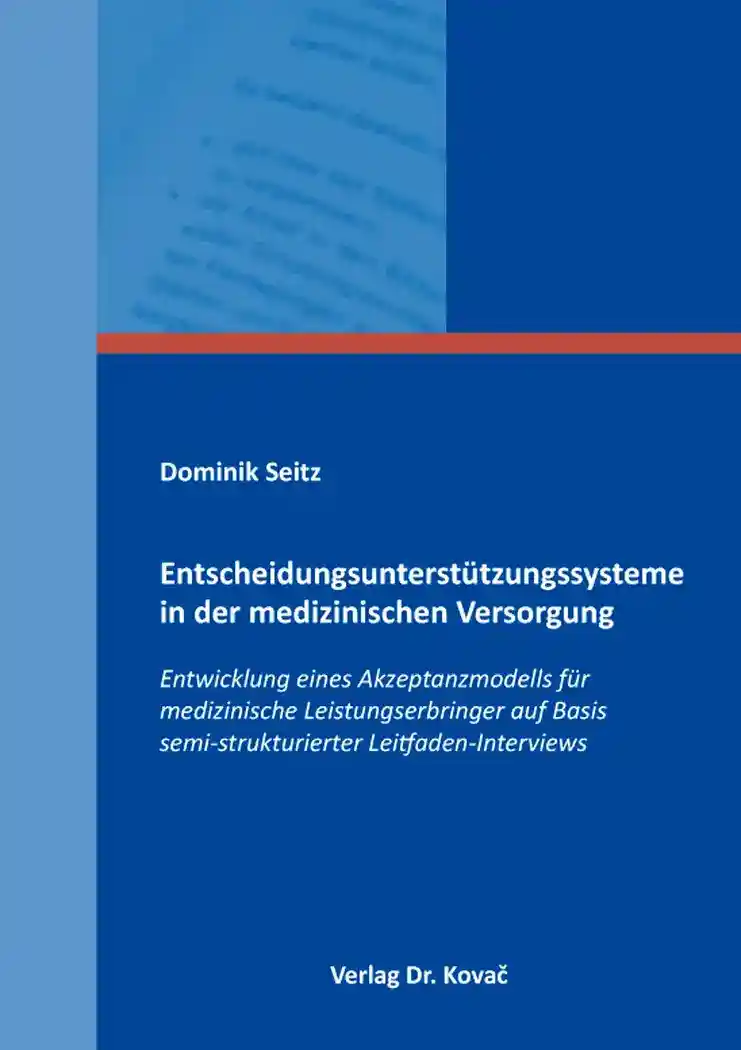Dominik SeitzEntscheidungsunterstützungssysteme in der medizinischen Versorgung
Entwicklung eines Akzeptanzmodells für medizinische Leistungserbringer auf Basis semi-strukturierter Leitfaden-Interviews
Gesundheitsmanagement und Medizinökonomie, volume 63
Hamburg 2023, 376 pages
ISBN 978-3-339-13450-9 (print) |ISBN 978-3-339-13451-6 (eBook)
About this book deutschenglish
The occurrence of diagnostic errors is estimated to be around 5% of all diagnoses and the economic impact is considered to be between 5% and 20% of the total healthcare expenditure. Chatbot-based clinical decision support systems (CDSS), which aim to support diagnostics, can help to reduce the number of diagnostic errors. However, a lack of user acceptance and insufficient integration of these applications into the daily routine of medical care providers prevent their widespread use and thus the realization of this potential.
The dissertation identifies solutions to the two aforementioned challenges. The results are based on a literature review and semi-structured interviews with 26 health care professionals.
The performance expectancy represents the most significant variable to describe the acceptance of CDSS. Respondents primarily expect the use of chatbot-based CDSS to result in a more complete diagnosis, suggestions for the further procedure or questions to be asked, and the detection of rare diseases, which will optimize the overall quality of the diagnostic process. In addition, trust in CDSS, effort expectancy, patient clientele, and facilitating conditions are identified as significant variables describing acceptance.
The integration of CDSS into medical care provision is described in three scenarios. In scenario one, patients use chatbot-based CDSS in their private environment, giving a relevant steering effect in particular to recommendations of the CDSS on urgency and the choice of the appropriate specialist. In scenario two, the patients use chatbot-based CDSS in the waiting room of the doctor's office, and in the third scenario, the doctor is the exclusive user of the CDSS.
The proof that the potentials associated with CDSS are transferable to everyday care remains outstanding. Moreover, medical care providers seem to be insufficiently prepared and incentivized for the regular use of CDSS. The integration of digital health care into medical studies and the introduction of pay for performance components could change this. Despite these challenges, there is widespread agreement among the interviewed experts that CDSS will play a central role in healthcare in the future.
Kontaktmöglichkeit
Keywords
ÄrzteAIAkzeptanzChatbotDiagnostische GenauigkeitEinsatz im AlltagEntscheidungsunterstützungFehldiagnosenKILeitfaden-InterviewsMedizinische VersorgungNutzenQualitative DatenerhebungVersorgungsforschungVersorgungsoptimierungIhr Werk im Verlag Dr. Kovač

Möchten Sie Ihre wissenschaftliche Arbeit publizieren? Erfahren Sie mehr über unsere günstigen Konditionen und unseren Service für Autorinnen und Autoren.
